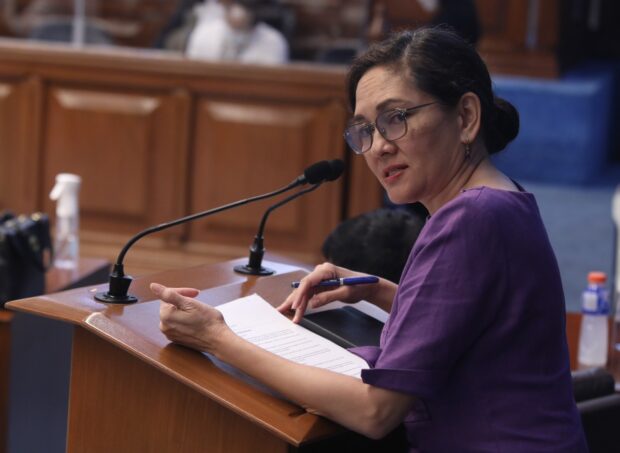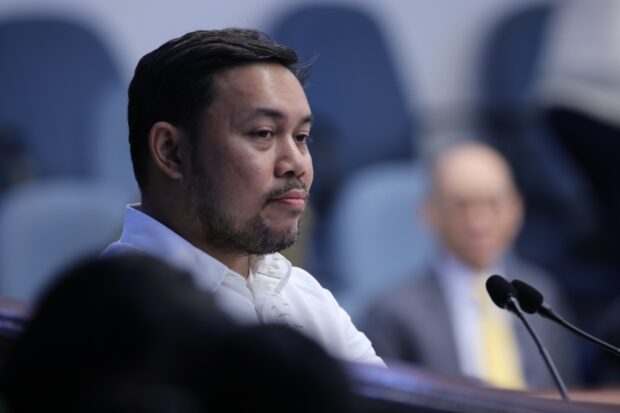Maharlika bill in Senate still allows SSS, GSIS investments

Sen. Risa Hontiveros questions why the provision that may justify the use of pension funds from both the GSIS and SSS still exists in the Senate version of the proposed “Maharlika Investment Fund Act” despite its removal from its counterpart bill in the House of Representatives. (Photo from the Senate Public Relations and Information Bureau)
MANILA, Philippines — The Maharlika Investment Fund (MIF) bill was heavily scrutinized in the Senate on Monday for still allowing the Social Security System and the Government Service Insurance System to invest in the controversial fund.
Opposition Sen. Risa Hontiveros raised concern over the section in the bill allowing other government financial institutions (GFIs) and government-owned or controlled corporations (GOCCs) to invest in the proposed MIF — “subject to their respective investment and risk management strategies, and approval of their respective boards.”
During her interpellations of the MIF bill, Hontiveros said she would seek to have the proposal amended to categorically prohibit GOCCs like the GSIS, SSS, and Home Development Mutual Fund from contributing to the proposed fund.
‘Neither requested nor required’
But Sen. Mark Villar, the main proponent of the MIF in the upper chamber, said he was “not convinced” that this option should be scrapped.
He said pensioners were “neither requested nor required” to invest in the proposed MIF.
Article continues after this advertisement“That’s just an option. They don’t have to invest. If they deem it not part of their investment strategy, they don’t have to invest in Maharlika. The point we’re simply making is that this is their option,” Villar said.
Article continues after this advertisementAccording to Hontiveros, however, it’s the duty of the Senate to weigh which options are good and which “may be dangerous or disadvantageous.”
“GSIS and SSS funds are owned by the members. They are not government funds and should not be touched by the government for our own disposal. So this should not be used to invest in the Maharlika. There shouldn’t be an option at all,” she said partly in Filipino.
The senator also argued that the involvement of SSS and GSIS in the proposed MIF had already been stricken out of the proposed measure that the House of Representatives approved in December 2022.
Hontiveros was referring to the lower chamber’s move to drop the SSS and GSIS as contributors to the proposed MIF following massive public outcry due to the involvement in the equation of state-run pension funds.
But the House-approved MIF bill also kept the investment window open for GFIs and GOCCs.

Sen. Mark Villar, the chairperson of the Committee on Trade, Commerce and Entrepreneurship, faces his colleagues during the plenary session Monday, May 29, 2023, as he defends Senate Bill No. (SBN) 2020 which seeks to establish the Maharlika Investment Fund (MIF). (Photo from the Senate Public Relations and Information Bureau)
‘Backdoor’ in the Senate version
Citing a “reliable source,” Hontiveros said it was GSIS President Jose Arnulfo Veloso himself who had proposed the MIF to President Ferdinand Marcos Jr.
“After feeling the anger of the public, the provision on the GSIS and SSS funds was scrapped, at least in the House version, but we’re now opening a backdoor in the version of the Senate,” she said.
If the GSIS tweaks its investment strategy, Hontiveros said, the state-run social insurance corporation could stake its funds in the proposed MIF.
The senator further noted that there is a video of Veloso saying that the GSIS was already reviewing, with the end goal of changing, its investment strategy.
“They thought ahead. Apparently, the review of the GSIS investment strategy has started and will be completed in a few months. So I would still insist that we should be worried about this,” Hontiveros said.
Proper signaling?
Villar questioned the message it would send to potential investors when government institutions are allowed to invest in foreign infrastructure projects and yet banned from doing the same for the country’s infrastructure projects.
“We need to give the proper signaling, and the proper signaling to attract investment is that the government is willing to invest in infrastructure for the country,” he said.
illar said he believes that “discouraging or sending a message that it is not profitable to invest in our country’s infrastructure” is not the right signal to send to investors.
Hontiveros agreed on the need to send the right message, especially to member contributors of state-run pension funds.
Sen. Pia Cayetano also weighed in, noting the history of funds in the Philippines “not being taken care of.”
“The signal that, I think, is most important is the assurance to the Filipino people that their hard-earned money in the pension funds are secured…It is our humble position that the pension funds need not have additional exposure,” she said.
The Senate leadership has set its sights on approving the MIF before Congress goes on sine die adjournment on June 2. It is even considering holding a session on Thursday to discuss pending bills for approval, including the proposed MIF.
The MIF bill in the Senate has been certified as urgent by Marcos, who once said the proposed investment fund was his idea.
This allows the chamber to forgo the constitutional requirement of a three-day period between the second and third reading of bills and, in effect, to approve the measure on both stages in one day.